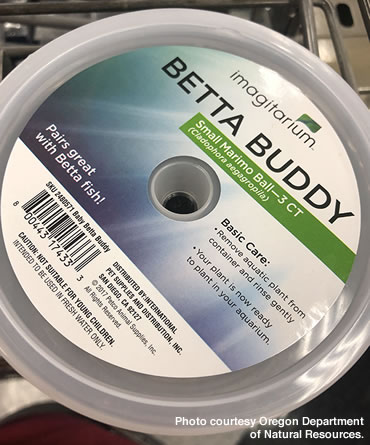Wildlife agencies across the nation are sounding the alarm that invasive zebra mussels have been detected in moss ball products designed for aquarium use, and commonly sold with fish and aquarium supplies, including retailers PetSmart and Petco.
State and federal fish and wildlife agencies are asking retailers to remove moss balls from their shelves. Aquarium owners are being asked to properly dispose of the algae product and decontaminate their tanks to prevent the potential spread of zebra mussels.
The North Carolina Wildlife Commission reports it has received notice that it appears the moss balls were imported from Ukraine to a distributor in California that recently shipped contaminated product to pet stores nationwide. The facility that imports the moss balls has been quarantined and all shipments of moss balls have been stopped, according to Montana Fish, Wildlife & Parks.
Zebra mussels are prolific breeders and can smother native mussels with their sheer number, or outcompete native species for food. Zebra mussels also cause problems for boaters by attaching to hulls and motors. 21 Zebra mussels can clog water intakes and pipes water treatment plants. They have been identified as one of the most destructive invasive species in North America.
The mussels have a D-shaped shell and alternating light and dark stripes. The invasive mollusks attach to hard surfaces, including rocks, stumps, boats, weeds, other mussels, boat motors, piers and the inside of water intake pipes. Once attached, they can form layers of living mussels that clog intake pipes and render cooling systems on boats inoperable.
Zebra mussels have microscopic larva, invisible to the naked eye, and can float in the water undetected for three weeks to three months depending on water temperatures.
They are filter feeders and pump water over their gills, filtering out small animals and plankton for food. A single adult zebra mussel can filter more than a quart of water per day, removing natural food sources that native species depend upon for survival. The zebra mussel’s ability to outcompete native mussels for food and space is particularly concerning for states with a diverse native mussel community, many of which are threatened or endangered.
 Known moss ball packaging reads Marimo Moss Ball Plant Grab & Go and Mini Marimo Moss Balls, Beta Buddy Marimo Balls, and Marimo Moss Ball Plant. There are likely more brands that contain the mussels. An overabundance of caution is suggested if you've purchased any moss balls recently.
Known moss ball packaging reads Marimo Moss Ball Plant Grab & Go and Mini Marimo Moss Balls, Beta Buddy Marimo Balls, and Marimo Moss Ball Plant. There are likely more brands that contain the mussels. An overabundance of caution is suggested if you've purchased any moss balls recently.
Find complete, detailed instructions to destroy moss balls, and clean aquariums on the U.S. Fish and Wildlife Service informational webpage.
Destroy, don’t dump and don’t flush! Briefly, you can quickly destroy moss balls using one of these methods:
FREEZE. Place the moss ball into a sealable plastic bag and freeze for at least 24 hours.
BOIL. Place the moss ball in boiling water for at least 1 full minute.
BLEACH. Submerge the moss ball in chlorine bleach for 20 minutes.
After destroying the moss ball, DISPOSE of the moss ball and any of its packaging in a sealed plastic bag in the trash. Do not dump moss balls down drains or in waterways or gardens.
– Resources: U.S. Fish and Wildlife Service, Association of Fish & Wildlife Agencies, Missouri Department of Conservation, New York State Department of Environmental Conservation, Indiana Department of Natural Resources, Iowa Department of Natural Resources, Maine Department of Inland Fisheries and Wildlife, North Dakota Game and Fish Department, Florida Fish and Wildlife Conservation Commission, South Carolina Department of Natural Resources, North Carolina Wildlife Resources Commission, Georgia Department of Natural Resources, Texas Parks and Wildlife Department, Arkansas Game and Fish Commission, Wyoming Game & Fish Department, Nebraska Game and Parks Commission, Montana Fish, Wildlife & Parks, Mississippi Department of Wildlife, Fisheries and Parks, Oregon Department of Fish and Wildlife, Kentucky Department of Fish and Wildlife, Louisiana Department of Wildlife and Fisheries, Tennessee Wildlife Resources Agency